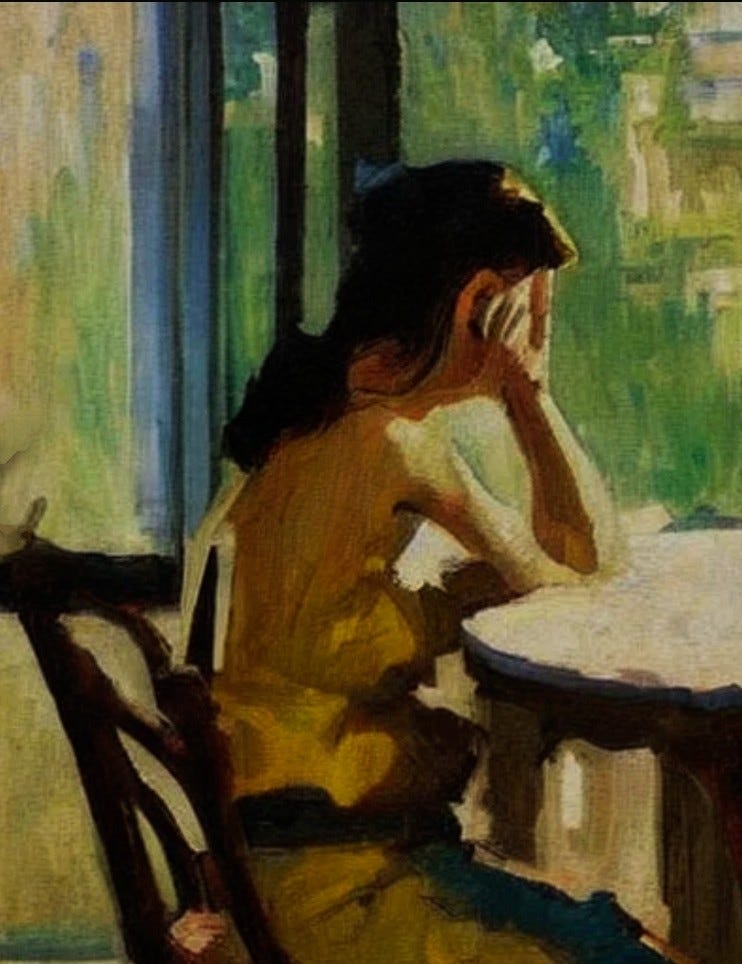For Saba
A bittersweet tale of grief and devotion by Zelda Knapp
Editor’s Note: This deceptively simple story is about one woman’s grief, but there’s a place at her table for anyone who knows the bitter taste of loss—in other words, for all of us. — David Michael Slater
She buys a jar of mini kosher dill pickles. The rest of her purchases are shallow, weightless objects—paper napkins, graham crackers, oatmeal, basil. Fresh mint and packing tape. These she carries lightly, swinging the bag in her left hand. The jar of pickles pulls on her right arm, tilting her off balance. Tilt, tilt, like a rigged pinball machine.
At home, she puts her purchases away with a quiet efficiency. The pickle jar stays in the center of the kitchen table. It’s early afternoon still, and she goes into the next room to read.
It is one year ago tonight.
At her bookcase, she absently slips books off the shelf, glancing at the backs before replacing them out of order. Maybe even this is in memory of him. Mom would follow in his wake when he visited, reordering the books he had shuffled through.
Mom will probably light a candle tonight. It’s the thing to do.
She glances back through the open doorway to the jar on the kitchen table, frowning. Maybe she should have bought fruit. When he came to stay, the fridge would be crowded with pears, peaches, nectarines, and plums. Fruits that anchored your teeth when you first broke their skin, fruits that filled your throat with sweet juices. He’d wrap his choice in a napkin while telling her about a book he’d read, a film he’d seen, a letter to the editor he was considering.
She could have gotten fruit. She hadn’t planned anything specific. But she saw the pickles, mini kosher dill, her favorite, and his, and grasped the jar without another thought.
At sundown, she sits at the table and twists the lid, popping the seal.
She forgets sometimes that he’s gone. Not him, she never forgets him. But that he’s not there anymore, a phone call or an email away. When he got sick, she started writing long sprawling letters to him, wanting to share every thought in her head, every book she was reading, every brilliant plan for her future. He replied each time, thoughtfully organized replies, the replies of a scholar who enjoyed studying people. She’d answer back with another sprawl, but she’d make sure to address each of his points.
Her fork spears out a pickle and she takes her first bite, crunch. She smiles at the sound. He always talked to her like she was a sensible person, even when she was mid-tantrum.
She tastes the sharp brine and the sour-sweet inside, crunch. Perfect. The sound is half the experience.
And she forgets sometimes that he’s gone because it’s not like she used to see him every day.
When he and Savta stayed, they alternated chores. One year they stayed for three months. Savta cooked, Saba washed up. Afterward, if her homework was done, they watched a movie.
He told her he didn’t like stories about miserable people leading miserable lives. He liked stories of redemption, stories that affirmed life and free will.
She spears out another pickle, then rotates the fork in an ungainly pas de bourree.
She’s never been much of a cook. No patience for anything more elaborate than boiled water or the microwave, but with Saba and Savta there were courses—soup or salad, then chicken with rice or vegetables. Popsicles later, during the movie, wrapped in a paper napkin. And a piece of fruit or two.
She would help him set the table. Even this was a more elaborate affair than on her own.
Not just plates and forks and cups—salt and pepper shakers, mustard, butter, an open jar of pickles. Good for snacking before the meal, pickles. Savta ate them too, of course, but that crunching sound—it was the same as when he bit into a pear or a nectarine. The sound was his.
And the taste of the brine, while he talked ideas with her, traded book titles, like she wasn’t a stupid teenager: that was his, too.
Maybe she should have bought nectarines.
She notices the jar is empty, save for the brine and the seeds, the peppercorns and spices. She carries it to the sink and slowly pours it out, watching the detritus collect in the strainer. She pours herself a glass of tap water and downs it there, no breath, leaning against the counter. It’s a lot of salt. She’ll be thirsty all night.
It was a year ago tonight, and she has to keep reminding herself he’s actually gone.
There’s something to be said for candle lighting, she supposes. The ritual of it. So it’s no longer your own private grief, but some sort of universal thing. A light that reaches out. Hello. Hello, I am still here.
She drinks another glass of water, then takes the empty jar back to the kitchen table where she sits, clutching it in both hands.
Her lips taste like vinegar, dill, garlic. She rolls her tongue across her teeth, an old habit, checking for seeds.
In all her long, sprawling emails, she never wrote, “I’ll miss you.” She didn’t say, “I don’t want you to go.” How can you add that weight to someone with no choice in the matter? But she wishes she had, to make sure he knew.
“I miss you.”
Tomorrow she should call Mom. Tomorrow she should email Savta. Tonight she sits in the fading light, tasting salt.
Zelda Knapp is a writer of many stripes in New York (short fiction, plays, poetry, theater reviews, television revisits, and academic scholarship) and an overall theater junkie. She graduated from NYU's Tisch School of the Arts with a BFA in Drama and a minor in Creative Writing. Her plays include Butterflies, This is Hell, Something On Your Mind, and her solo show Evidence, which played at Theatre Row in NYC. Her short fiction and poetry have been published by Standard Culture and The Biscuit, along with her first collection, This Is What They Made It Out Of: tales from the end of the world. She reviews theater on A work unfinishing, as well as reviewing television revisits on Once More With Extreme Prejudice. Her articles on musical theater have been published by Routledge, Oxford, and in various journals.
Five tiny delights:
A crisp autumn day
Gala apples (again with the crispness)
Rosamund Pike reading the audiobook of Pride and Prejudice
Theater in a non-proscenium staging
Stitch (you know, the little blue alien made by the Mouse?)
Five tiny Jewish delights:
Matzoh ball soup at the 2nd Avenue Deli (marked as Jewish Penicillin on the menu)
How the entire house smells like oil when my stepmom makes latkes
That one of our symbols is the word for life
Rony Oren's Claymation-animated Haggadah that I grew up with
The tiniest Jewish delight of all: my pocket-sized Ima!





This is bittersweet and beautiful.
And it literally drove me to buy a jar of pickles for the first time in years.
Just two words: hauntingly moving.